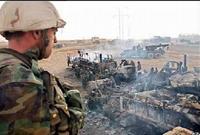

Iraq must be the first country in history to have a constitutional crisis before a constitution. Having failed to meet its third extended deadline for producing a viable document to go to the October 15 national plebsicite, the transitional assembly has granted itself one more day to reach consensus over a federal governmental structure or have the Kurdish and Shi'ite delegates ram through their version with superior numbers (221 out of 275 seats). The alternative is to dissolve parliament and start the process all over again, an unthinkable prospect but one scarcely less fraught with risk than ploughing ahead without the support of the assembly's Sunni representatives. They may owe their places to government appointment rather than the ballot box - a result of the Sunni boycott of the January05 elections - but that doesn't mean they don't command the support of their constituency, and hence the means to scuttle the constitution through a two-thirds 'no' vote in three provinces in October (Sunnis are a majority in four).
Anyone who's been through a constitutional drafting process knows that the chance of genuine compromise after three missed deadlines is remote, but even a miracle may be too late, with rival Shi'ite factions now at each other's throats across the country's south. Moqtada al-Sadr's Mehdi army has finally taken SCIRI head-on over who controls the future of the Shi'ite community, as if to give us final proof that Iraq's postwar political process has been an exercise in putting the cart before the horse. As argued in my previous Iraq post, what's been attempted since March03 is the equivalent of trying to patch Yugoslavia back together during the early 1990's through the democratic process. It connects with reality only at the point of the Bush administration's political agenda, most lately evidenced by the direct role in the constitutional drafting process taken by US ambassador Zalmay Khalilzad, who's been involved in this project from the outset - i.e. for the better part of two decades or longer, depending on how far you go in for neocon conspiracy theories.
The upsurge in intra-Shi'ite violence has put the spotlight on subversive Iranian influence in Iraq, revelations of which have been around for some time but have attracted curiously little attention, other than from committed 'rogue-statists' like Michael Ledeen. Despite holding all the cards, Washington seems to be losing its twenty-five yaer old polka game with the Islamic Republic. Instead of consolidating US primacy in the Middle East, the invasion of Iraq has gone a long way towards levelling the regional power landscape, which in practice means clearing the way for Teheran's long-term ascendancy.
Anyone who's been through a constitutional drafting process knows that the chance of genuine compromise after three missed deadlines is remote, but even a miracle may be too late, with rival Shi'ite factions now at each other's throats across the country's south. Moqtada al-Sadr's Mehdi army has finally taken SCIRI head-on over who controls the future of the Shi'ite community, as if to give us final proof that Iraq's postwar political process has been an exercise in putting the cart before the horse. As argued in my previous Iraq post, what's been attempted since March03 is the equivalent of trying to patch Yugoslavia back together during the early 1990's through the democratic process. It connects with reality only at the point of the Bush administration's political agenda, most lately evidenced by the direct role in the constitutional drafting process taken by US ambassador Zalmay Khalilzad, who's been involved in this project from the outset - i.e. for the better part of two decades or longer, depending on how far you go in for neocon conspiracy theories.
The upsurge in intra-Shi'ite violence has put the spotlight on subversive Iranian influence in Iraq, revelations of which have been around for some time but have attracted curiously little attention, other than from committed 'rogue-statists' like Michael Ledeen. Despite holding all the cards, Washington seems to be losing its twenty-five yaer old polka game with the Islamic Republic. Instead of consolidating US primacy in the Middle East, the invasion of Iraq has gone a long way towards levelling the regional power landscape, which in practice means clearing the way for Teheran's long-term ascendancy.

2 comments:
See this Open Democracy article for a more in-depth look at Iraq's constitutional process.
The part about the divergence between the Shi'ite political parties and the general Shi'ite population is particularly interesting.
And it's finally here.
Post a Comment